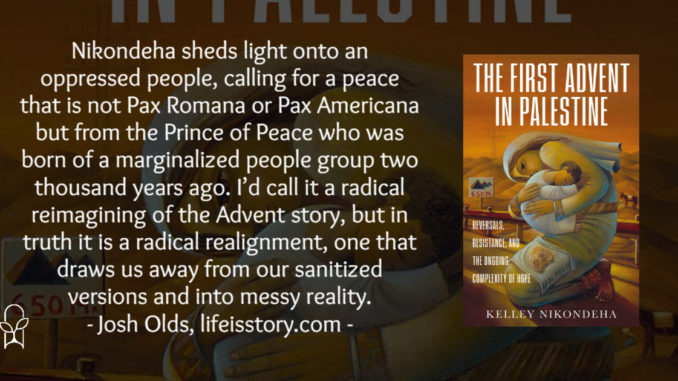
Published by Broadleaf Books on October 4, 2022
Genres: Non-Fiction, Christmas, Social Justice
Buy on Amazon
Goodreads

When we picture the first Advent, we see Mary and Joseph huddled by a manger. We picture Gabriel, magi, and shepherds tending their flocks. A shining star against a midnight sky. But this harmonized version has lifted the Advent story out of its context--those who experienced the first Advent had to travel through great darkness to reach the hope that shining star announced. Trusted scholar and community organizer Kelley Nikondeha takes us back, to where the landscape of Palestine is once again the geographic, socioeconomic, and political backdrop for the Advent story.
Reading the Advent narratives of Luke and Matthew anew, in their original context, changes so much about how we see the true story of resistance, abusive rulers and systems of oppression, and God coming to earth. In Luke, Rome and Caesar loom, and young Mary's strength and resolve shine brightly as we begin to truly understand what it meant for her to live in the tumultuous Galilee region. In Matthew, through Joseph's point of view, we see the brutality of Herod's rule and how the complexities of empire weighed heavily on the Holy Family. We bear witness to the economic hardship of Nazareth, Bethlehem, and the many villages in between--concerns about daily bread, crushing debt, land loss, and dispossession that ring a familiar echo to our modern ears. Throughout her explorations, Nikondeha features the stories of modern-day Palestinians, centering their voices to help us meet an Advent recognizable for today. This thought-provoking examination invites us into a season of discovery, one that is realistic and honest, and that still wonders at the goodness of God's grace.
Every year approximately five thousand volumes about Advent are published. I don’t know if that’s true, but it certainly feels like it. Every year, right around Advent, I find my TBR pile filled with review and endorsement requests for Advent devotionals and other Advent or Christmas-themed literature. And most of them…are fine. They’re fine. Perfectly serviceable. But it can be difficult to tell the world’s most famous story in a way that doesn’t seem like a retread of everything you’ve heard before. Unless you flip the script. Unless you upend the narrative. Unless you move into the Ancient Near East to experience Advent as the Holy Family first experienced it—The First Advent in Palestine.
Kelley Nikondeha’s refreshing take on Advent follows a mostly-traditional structure. It is set up as a series of stories, each with their own focus and portion of Scripture to reflect upon. The first indication that this isn’t an Advent like most other Advents comes at the beginning where The First Advent in Palestine doesn’t just focus on hope and longing, but silence and suffering. Nikondeha grounds the story of Advent in the story of the Maccabees—and in the story of current Palestinian suffering. From there, the story branches out to look the false peace of the Pax Romana and how it contrasts to the peace promised by God. Nikondeha tells the story of Zechariah, Mary, Elizabeth, and Joseph. She writes about the economic and political realities of the day, interspersing it with stories about the modern-day reality. It’s a story of hope and struggle, victory and suffering, advance and retreat. It’s not your typical Advent story. It’s so much more than that.
Kelley Nikondeha presents an Advent I can believe in, an Advent that has weight, an Advent that means something in this present world as well as the one to come. In the conclusion of The First Advent in Palestine, she writes that that Advent narratives are “the revelation of God engaging with human trauma of a specific place and specific people. God experienced the excruciating reality of empires and economies from the position of the weak and powerless ones.” This is an Advent of liberation, a message that is truly Good News to all whom that message was delivered—and anathema to the powers like Herod who stood in its way. In that, it becomes a cautionary tale for our own time. Where are we in this story? By intermingling her interactions with the Palestinian people into the story, Nikondeha reveals that Western Christianity just may come to Christ more like Herod than the shepherds.
The First Advent in Palestine underscores the political ramifications of the first Advent and how the rumblings from that continue on into and cry out from the current situation of oppression in Palestine today. Nikondeha sheds light onto an oppressed people, calling for a peace that is not Pax Romana or Pax Americana but from the Prince of Peace who was born of a marginalized people group two thousand years ago. I’d call it a radical reimagining of the Advent story, but in truth it is a radical realignment, one that draws us away from our sanitized versions and into messy reality. This is now my annual Advent read.
